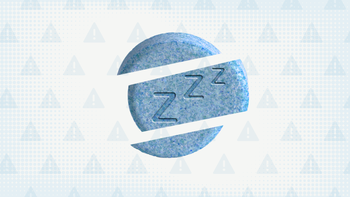
6 Health Benefits of Taking Melatonin Beyond Sleep
Key takeaways:
Melatonin plays a key role in helping you sleep and boosting sleep quality. But it affects your body in many other ways.
Much of your body’s melatonin production occurs in your gut. Researchers are looking at whether melatonin can improve irritable bowel syndrome (IBS) and heartburn symptoms.
Researchers are looking at whether melatonin may have other effects, like helping reduce pain and anxiety.
Access savings on related medications
Table of contents

If you’re taking melatonin for sleep, you may be wondering if you can get additional benefits from the sleep aid. Some researchers believe that melatonin, a hormone that you produce naturally, does more than just put you to sleep at night.
The research is in its early stages. But studies suggest that melatonin may play a role in many health conditions, from gut issues to migraines and heart disease risks.
What is melatonin?
Melatonin is a hormone that’s made mostly in the brain. But some is also made in the gut. When it gets dark at the end of the day, the pineal gland in your brain releases this hormone.
Melatonin helps with sleep and the timing of your body clock, also known as the circadian rhythm. But melatonin is found in many tissues throughout the body, where it may affect more than just sleep. For example, it’s thought to be an antioxidant and may have anti-inflammatory properties.
Why do you need a melatonin supplement?
As you age, your body produces less melatonin. Melatonin production also declines after menopause.
Other factors can also lower how much melatonin your body makes, such as:
Illness
Medications
Shift work
Jet lag
Bright lights at night
Melatonin likely has a role in many body functions. So, adding a supplement may be helpful to make up for the decrease in natural melatonin.
What are the benefits of taking melatonin?
The sleep benefits of melatonin are well known. It helps people with insomnia, jet lag, and delayed sleep-phase disorder (which affects your circadian rhythm). It can also help with sleep problems related to shift work.
Here are some additional and surprising body benefits of melatonin.
1. Keeping your GI tract healthy
A large amount of the body’s melatonin is produced in the gut (though it doesn’t travel to the rest of the body). There’s a very high concentration of melatonin in the gut. Because of this, researchers believe it plays a role in supporting digestive health.
Melatonin may have a variety of effects on digestion. The research on melatonin has been on people with irritable bowel syndrome (IBS). This is a gastrointestinal disorder that causes abdominal pain and changes in your stool. The research is still very early, so it’s hard to say whether melatonin can help treat IBS.
But one study looked at people with IBS who took 2 low doses of melatonin a day — 3 mg in the morning and 5 mg at bedtime. They had the following improvements:
Less constipation: Half of those with IBS whose main symptom was constipation had less constipation after 6 months of taking melatonin.
Less pain and bloating: And almost three-quarters also had less pain and bloating.
2. Helping acid reflux
There’s some research showing that melatonin may help people with gastroesophageal reflux disease (GERD). More research is needed, though, before it can be recommended as part of reflux treatment.
One small study looked at people who took melatonin along with a proton-pump inhibitor (PPI). This is a common medication used to treat GERD. About 87% of the participants had less heartburn. That’s better than the control group, who only took a PPI and saw a 58% drop in heartburn.
In another small study, melatonin eliminated upper abdominal pain in just over half of people with indigestion after 12 weeks.
3. Reducing heart risks
If you’re taking melatonin, you may get some heart benefits as well. A handful of small studies have found some encouraging effects.
A small study looked at the effects of melatonin on people with metabolic syndrome. This is a group of conditions that raises the risk of cardiovascular disease and diabetes. In the study, those who took a daily 5 mg dose of melatonin for 2 months had the following results:
Lower blood pressure
Lower levels of the “bad” cholesterol, low-density lipoprotein (LDL)
Increased antioxidant activity, which protects cells from damage
4. Helping migraines and headache
Melatonin may help make certain types of headaches less intense, particularly migraines. A review of research found that melatonin reduced:
How often migraine attacks occur
How severe the migraines are
How long the migraines last, compared to a placebo
Taking melatonin might also help lower how many migraines you have per month. One study looked at people who got two to eight migraines a month. The participants took 3 mg of melatonin daily and saw these results:
They had almost three fewer migraines per month, on average.
They didn’t need to take as much pain medication.
And it made their migraine attacks shorter and less intense.
Melatonin may help with cluster headaches as well. In a small study, melatonin reduced the number of cluster headaches in people who have episodic cluster headaches (they occur for a period of weeks to months). However, melatonin didn’t help those with chronic cluster headaches, which are year-round.
5. Pain relief
Melatonin may have some pain-relieving effects at higher doses. For instance, people with fibromyalgia — a chronic condition that causes pain all over the body — have had less pain after they started taking melatonin. They had some pain relief when taking 3 mg or 6 mg doses at bedtime. But pain was much less with doses of 9 mg to 15 mg.
In another small study, melatonin was shown to reduce pelvic pain caused by endometriosis.
6. Ease anxiety before medical procedures
Can melatonin help you keep calm? Yes, at least in some situations.
For instance, the hormone may reduce anxiety before surgery, according to a review of almost 30 trials. Here’s what the review found:
Melatonin worked as well as benzodiazepines like alprazolam (Xanax) and diazepam (Valium).
Melatonin was less sedating than those drugs.
People seemed to tolerate melatonin better.
Benzodiazepines can also be addictive, whereas melatonin isn’t.
Some dentists are using melatonin to help reduce anxiety before dental procedures.
The bottom line
Melatonin has a strong track record of improving sleep in people who have difficulty falling and staying asleep. Some research shows that it may have other health benefits as well. It may help with gut issues, like IBS and heartburn. It may also help keep your cardiovascular system healthy. And it could help reduce anxiety and pain. It’s important to make sure you don’t sabotage your body’s natural release of melatonin at night. This means avoiding bright lights and screens in the hour or two before bedtime. Taking a melatonin supplement may offer an additional health boost.
Why trust our experts?



References
Arendt, J., et al. (2022). Physiology of the pineal gland and melatonin. Endotext.
Castaño, M. Y., et al. (2018). Melatonin improves mood status and quality of life and decreases cortisol levels in fibromyalgia. Biological Research for Nursing.
Chojnacki, C., et al. (2013). Influence of melatonin on symptoms of irritable bowel syndrome in postmenopausal women. Endokrynologia Polska.
Fowler, S., et al. (2022). Circadian rhythms and melatonin metabolism in patients with disorders of gut-brain interactions. Frontiers in Neuroscience.
Gonçalves, A., et al. (2016). Randomized clinical trial comparing melatonin 3 mg, amitriptyline 25 mg and placebo for migraine prevention. Journal of Neurology, Neurosurgery & Psychiatry.
Klupińska, G., et al. (2007). Therapeutic effect of melatonin in patients with functional dyspepsia. Journal of Clinical Gastroenterology.
Koziróg, M., et al. (2010) Melatonin treatment improves blood pressure, lipid profile, and parameters of oxidative stress in patients with metabolic syndrome. Journal of Pineal Medicine.
Leone, M., et al. (1996). Melatonin versus placebo in the prophylaxis of cluster headache: A double-blind pilot study with parallel groups. Cephalalgia.
Madsen, B., et al. (2020). Melatonin for preoperative and postoperative anxiety in adults. Cochrane Database Systematic Reviews.
Malekpour, H., et al. (2023) Is the addition of sublingual melatonin to omeprazole superior to omeprazole alone in the management of gastroesophageal reflux disease symptoms: A clinical trial. Turkish Journal of Gastroenterology.
Minich, D., et al. (2022). Is melatonin the “next vitamin D”?: A review of emerging science, clinical uses, safety, and dietary supplements. Nutrients.
Puliappadamb, H. M., et al. (2022). Efficacy and safety of melatonin as prophylaxis for migraine in adults: A meta-analysis. Journal of Oral & Facial Pain and Headache.
Schwertner, A., et al. (2013). Efficacy of melatonin in the treatment of endometriosis: A phase II, randomized, double-blind, placebo-controlled trial. Pain.
Siah, K. T. H., et al. (2014). Melatonin for the treatment of irritable bowel syndrome. World Journal of Gastroenterology.
Was this page helpful?
Related Articles
Browse medications
View AllResearch prescriptions and over-the-counter medications from A to Z, compare drug prices, and start saving.


























